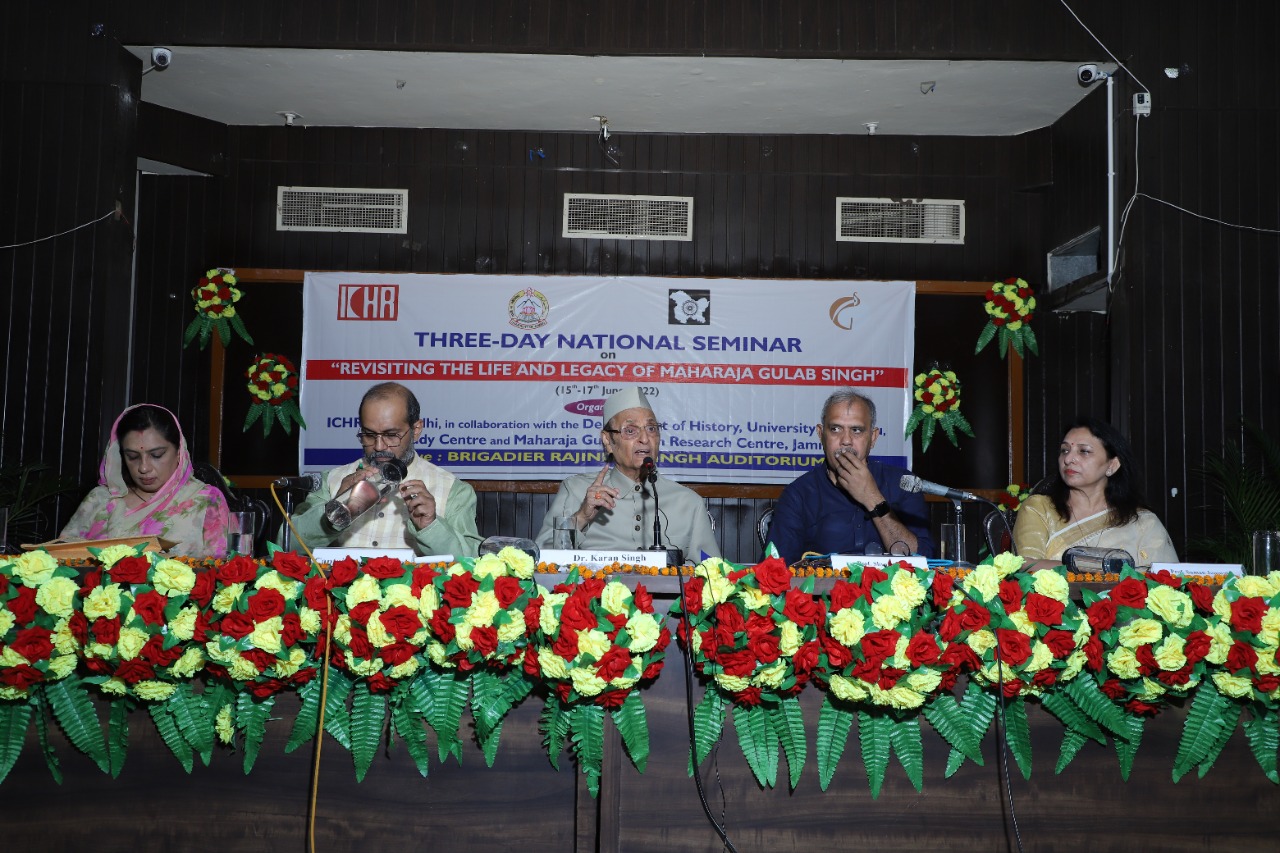About University

Cradled in the lap of mountains at the foothills of auspicious Trikuta, besides the river Tawi at an altitude of 1030 ft. is Jammu. This 'city of temples' has many places...
Three-day National Seminar on ‘Revisiting Life and Legacy of Maharaja Gulab Singh’ concluded here today at Jammu University. The seminar was organised by the Department of History, University of Jammu in collaboration with Indian Council of Historical Research (ICHR), Jammu Kashmir Study Centre and Maharaja Gulab Singh Research Centre.
Dr Karan Singh was the Chief Guest during the valedictory function, which was earlier inaugurated by the Vice Chancellor of Jammu University, Prof Umesh Rai.
Speaking on the occasion, Dr Karan Singh lauded the efforts of the Department of History, University of Jammu and ICHR in organizing the seminar. He threw light on the Raj Tilak ceremony of Maharaja Gulab Singh by Sher-e-Punjab Maharaja Ranjit Singh.
He also focused on the consolidation of this region by Maharaja Gulab Singh and the hardships and sacrifices made by the Dogras of the region.
“Maharaja Gulab Singh and his army faced great hardships in Gilgit, Baltistan and Ladakh region, but they were firm with their vision in consolidating this region,” Dr Karan Singh said and appreciated the first five Maharajas starting with Maharaja Gulab Singh and how they consolidated this whole region and their contribution in making the erstwhile state of Jammu and Kashmir.

Dr Karan Singh further suggested that a seminar on General Zorawar Singh, whose contribution has been neglected to some extent, should also be organized.
Earlier, Prof. Suman Jamwal presented opening remarks of the session. She extended her heartfelt welcome to Dr. Karan Singh, the Heir Apparent of the erstwhile State of J&K. Prof. Suman Jamwal also welcomed Captain Alok Bansal for presiding over the session on a very short notice. She extended her earnest thanks to Kunwarani Ritu Singh for being a part of the session and sparing time from her busy schedule.
The report of the Seminar was presented by Prof. Shyam Narayan Lal who gave a comprehensive detail of the central theme of all the papers. He revisited the History of Maharaja Gulab Singh and how the Treaty of Amritsar needs to be studied by understanding the contemporary circumstances and how they shaped the formation of the modern state of J&K.
The Presidential address was given by Cap. Alok Bansal, who thanked Dr. Karan Singh for gracing the occasion. He stressed on the fact that the areas of North, which are now not part of India, but had been conquered under Maharaja Gulab Singh need to be made part of the present day Indian geo-political terrain.
Dr. Versha Gupta extended a formal vote of thanks, expressing gratitude towards all the participants, especially Dr. Karan Singh for gracing the occasion. The session was hosted and moderated by Dr. Saurabh Mishra from ICHR.
The seventh technical session was chaired by Sh. Harbans Singh Sambyal in the Brig. Rajindra Singh Auditorium. The speakers Dr. Shreeya Bakshi, Dr. Diljit Singh, Dr. Rajesh Prasad gave a detailed description of the Jammu conquests of Maharaja Ranjit Singh and how Maharaja Gulab Singh started coming into picture from then on. A parallel session was chaired by Dr. Madhulika Singh, in which speakers focused on the issue of PRC and the making of the modern state of J&K. In another Session, which was chaired by Dr. Kanwar Chanderdeep Singh, the speakers focused their papers on mapping the rise of Maharaja Gulab Singh and establishing the relationship between Jammu and Lahore Darbar.